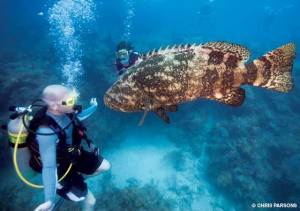Recently, there have been some big changes being discussed regarding the protection regulations for two of my favorite marine animals: dolphins and grouper. Many of my peers may laugh at this, but I am the quintessential marine biologist that has always loved dolphins and would have chosen to be a dolphin when I grew up if that was a viable option. My affinity for grouper developed more recently when I began performing coral reef surveys and counting grouper and other marine predators for my research. Both of these marine animals are worth protecting and the possible changes to their protection should be taken seriously.
NOAA’s Marine Mammal Acoustic Guidelines

Image from http://www.imms.org/dolphin_program.php
As you may know, marine mammals, like dolphins and whales, use sound to navigate, hunt, and communicate. This is useful in the ocean as sound travels much farther than light. However, this property of water means that the sounds humans are introducing to the ocean through sonar, explosives, drilling, shipping, etc. are also traveling throughout the ocean. This “noise pollution” can damage the hearing of marine mammals, disrupt their normal communication and navigation, as well as alter other behaviors than can reduce the fitness of these animals. NOAA is currently in the processes of developing thresholds to regulate acoustic noise to prevent harm to marine mammals. The draft of the guidelines are available here and more information about this process can be found on the NOAA page here. The public comment period of this process opened on Dec 31, 2013 and will continue until Jan 27, 2014. If you are interested, you can comment on the proposed guidelines, register for the Public Meeting Webinar on Jan 14th, check out the Frequently Asked Questions, or email Amy R. Scholik-Schlomer at Amy.Scholik@noaa.gov for more information.
Goliath Grouper Moratorium
The Joint Council Committee on South Florida Management Issues has recently held meetings to discuss lifting the moratorium on goliath grouper that has been in place since 1990. Goliath grouper are predatory fish that can grow up to 2.5 meters long and are unfortunately, extremely overfished. Goliath grouper are vulnerable to overfishing because they grow very slowly and depend on spawning aggregations for successful reproduction, 80% of which are now endangered. The IUCN Red List has labeled this species as Critically Endangered. Why would anyone think to lift the protection from a critically endangered fish, you might ask? There is a misconception that the recovery of Goliath grouper is to blame for the declining fish and lobster stocks in Florida because these large fish are predators. However, a recently published study by S. Frias-Torres (2013) (available here) indicates that it is overfishing that has reduced Florida’s fisheries stocks, not Goliath grouper. Personally, I don’t see that logic that more fishing will fix a problem that fishing initially caused. If you would like more information on this issue, check out Dr. Frias-Torres’s blog posts about her paper and the reasons it is necessary to continue the moratorium. If you would like to get involved, you can also sign this petition that will be sent to Florida officials.

Reblogged this on High on Science & Tech – H.O.S.T.
LikeLike
Pingback: Cetaceans react to seismic exploration | UNder the C